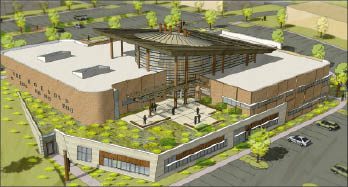Tribe garners $11.8 million for medical center project
Federal funds to cover two-thirds of overall cost of Plummer, Idaho, facility

The Coeur d'Alene Tribe says it has received $11.8 million in federal funds to help build a new, $17.3 million Benewah Medical Center, in Plummer, Idaho, located about 30 miles south of Coeur d'Alene along U.S. 95.
The tribe says it expects to solicit construction bids for the project next spring, and anticipates that the two-story, 47,000-square-foot medical center, which will replace a much smaller 20-year-old facility, will open in the fall of 2012.
"We are extremely pleased because this grant will make a big difference in people's lives," says Coeur d'Alene Tribe Chairman Chief Allan. "The tribe has always wanted to provide the best possible health care—not only for the tribal membership, but everyone living on the reservation. This funding will help fulfill that goal."
The federal award is being provided through the Affordable Care Act and will cover 68 percent of the total project cost, the tribe says. It says it will contribute $3 million to the project, and its current medical center has set aside the remaining $2.5 million needed to fund the project.
The federal money is part of $727 million in grants that the U.S. Department of Health and Human Services announced recently it was awarding to 143 community health centers nationwide. Those grants are the first of $11 billion in grants the agency said it will allocate to community centers over the next five years as part of health-care reform legislation.
Jim Murphy, Benewah Medical Center's finance director and new clinic project manager, says, "This funding is available because 20 years ago the Coeur d'Alene Tribe became the first tribe in the nation to open its clinic doors to the entire community and subsequently became a community health center."
The current medical center, located in downtown Plummer, consists of a main building and a couple of portable structures. It employs 122 people and serves 6,500 patients, who account for more than 36,000 visits annually. Roughly half of those patients aren't tribal members. Since opening, the tribe says, the center has provided care to more than 17,500 people. The medical center doesn't have patient beds, so it's not a hospital, operating rather as a clinic offering an array of outpatient services.
The new medical center building will be developed on a sloped six-acre parcel of farm land on the west side of U.S. 95 about a mile northwest of the current center and will have more than twice as much space. It will allow all of the center's medical, dental, community health, and counseling services to be located under one roof, providing greater convenience for care providers and patients, the tribe says.
Murphy says it will include larger examination rooms than those in the current medical center, a larger pharmacy, and more laboratory space, while also providing room to grow.
The building will feature a silo-shaped central rotunda, protruding through a large, overhanging sloped roof and surrounded by portions of the center in which various services will be housed. The rotunda will be located just behind the main entry and a covered drop-off area. The building's exterior will incorporate a mix of brick, concrete block, and glass.
Jeani Natwick, NAC|Architecture's principal in charge of the project, says the structure's design is intended to blend in with the surrounding landscape. The building is being designed to meet Leadership in Energy and Environmental Design (LEED) standards, but the tribe hasn't decided whether it will seek formal LEED certification for the structure, says tribal spokesman Marc Stewart.
Stewart says it's unclear yet whether the medical center will need to hire more employees to staff the larger facility. He also says the tribe hasn't decided yet what it will do with the structures the medical center will vacate when it moves to the new facility.
In announcing the initial federal grant awards, HHS Secretary Kathleen Sebelius said, "There is no question that the economic downturn has made it harder for some Americans to get health care and important preventive services. Community health centers provide quality health-care services to Americans across the country, but are a lifeline for those who have lost coverage or are between jobs."
She added, "These funds from the Affordable Care Act will help get more people care in some communities where there have not been many options in the past. The newly constructed or expanded community health centers will provide care to an additional 745,000 patients and much needed employment opportunities in both rural and urban underserved communities."
Related Articles




